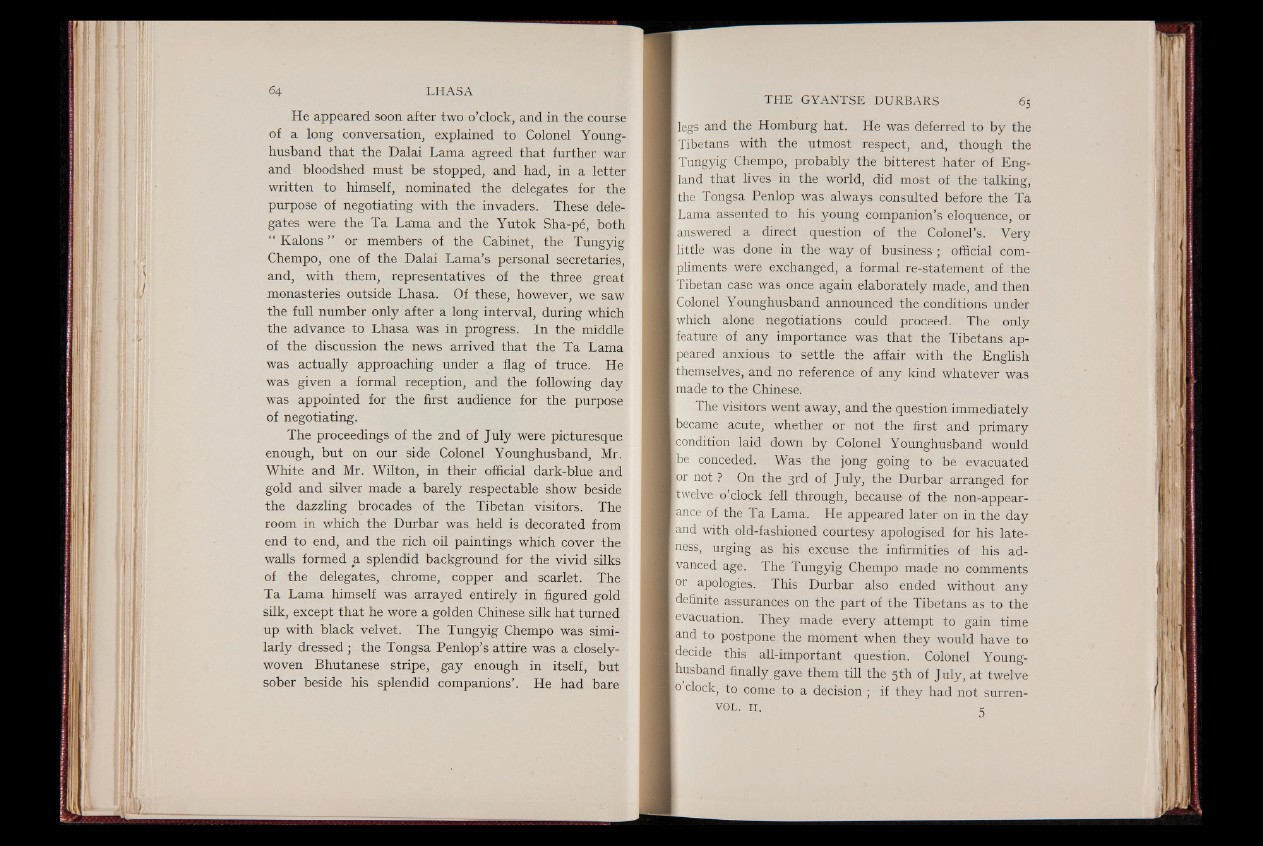
He appeared soon after two o’clock, and in the course
of a long conversation, explained to Colonel Young-
husband that the Dalai Lama agreed that further war
and bloodshed must be stopped, and had, in a letter
written to himself, nominated the delegates for the
purpose of negotiating with the invaders. These delegates
were the Ta Lama and the Yutok Sha-pé, both
“ Kalons | or members of the Cabinet, the Tungyig
Chempo, one of the Dalai Lama’s personal secretaries,
and, with them, representatives of the three great
monasteries outside Lhasa. Of these, however, we saw
the full number only after a long interval, during which
the advance to Lhasa was in progress. In the middle
of the discussion thé news arrived that the Ta Lama
was actually approaching under a flag of truce. He
was given a formal reception, and the following day
was appointed for the first audience for the purpose
of negotiating.
The proceedings of the 2nd of July were picturesque
enough, but on our side Colonel Younghusband, Mr.
White and Mr. Wilton, in their official dark-blue and
gold and silver made a barely respectable show beside
the dazzling brocades of the Tibetan visitors. The
room in which the Durbar was held is decorated from
end to end, and the rich oil paintings which cover the
walls formed a splendid background for the vivid silks
of the delegates, chrome, copper and scarlet. The
Ta Lama himself was arrayed entirely in figured gold
silk, except that he wore a golden Chinese silk hat turned
up with black velvet. The Tungyig Chempo was similarly
dressed ; the Tongsa Penlop’s attire was a closely-
woven Bhutanese stripe, gay enough in itself, but
sober beside his splendid companions’ . He had bare
TH E G Y A N T S E D U R B A R S 65
■legs and the Homburg hat. He was deferred to by the
■ Tibetans with the utmost respect, and, though the
I Tungyig Chempo, probably the bitterest hater of Eng-
llan d that lives in the world, did most of the talking,
■ the Tongsa Penlop was always consulted before the Ta
I Lama assented to his young companion’s eloquence, or
■ answered a direct question of the Colonel’s. Very
I little was done in the way of business ; official com- J pliments were exchanged, a formal re-statement of the
Tibetan case was once again elaborately made, and then
Colonel Younghusband announced the conditions under
I which alone negotiations could proceed. The only
feature of any importance was that the Tibetans appeared
anxious to settle the affair with the English
themselves, and no reference of any kind whatever was
made to the Chinese.
The visitors went away, and the question immediately
became acute, whether or not the first and pr im a r y
¡condition laid down by Colonel Younghusband would
be conceded. Was the jong going to be evacuated
[or not ? On the 3rd of July, the Durbar arranged for
■twelve o’clock fell through, because of the non-appear-
“ ance of the Ta Lama. He appeared later on in the day
and with old-fashioned courtesy apologised for his lateness,
urging as his excuse the infirmities of his advanced
age. The Tungyig Chempo made no comments
or apologies. This Durbar also ended without any
definite assurances on the part of the Tibetans as to the
¡evacuation. They made every attempt to gain time
and to postpone the moment when they would have to
decide this all-important question. Colonel Younghusband
finally gave them till the 5th of July, at twelve
0 clock, to come to a decision ; if they had not surren-
V O L . I I . h